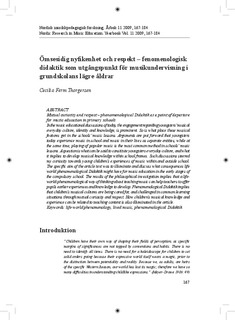Ömsesidig nyfikenhet och respekt – fenomenologisk didaktik som utgångspunkt för musikundervisning i grundskolans lägre åldrar
Chapter, Peer reviewed
Permanent lenke
http://hdl.handle.net/11250/172225Utgivelsesdato
2009Metadata
Vis full innførselSamlinger
- Artikler og bokkapitler [390]
Originalversjon
I: F. V. Nielsen, S.-E. Holgersen & S. Graabræk Nielsen (Red.) Nordic Research in Music Education. Yearbook Vol. 11 2009, 167-183Sammendrag
Mutual curiosity and respect – phenomenological Didaktik as a point of departure for music education in primary schools
In the music educational discussions of today, the engagement regarding youngsters’ musical everyday culture, identity and knowledge, is prominent. So is what place these musical features get in the schools’ music lessons. Arguments are put forward that youngsters today experience music in school and music in their lives as separate entities, while at the same time, playing of popular music is the most common method in schools’ music lessons. A question is what can be said to constitute youngsters everyday culture, and what it implies to develop musical knowledge within school frames. Such discussions steered my curiosity towards young children’s experiences of music within and outside school. -- The specific aim of the article text was to illuminate and discuss what consequences life world phenomenological Didaktik might have for music education in the early stages of the compulsory school. The results of the philosophical investigation implies that a lifeworld-phenomenological way of thinking about teaching music can help teachers to offer pupils earlier experiences and knowledge to develop. Phenomenological Didaktik implies that children’s musical cultures are being cared for, and challenged in common learning
situations through mutual curiosity and respect. How children’s musical knowledge and experience can be related to teaching content is also illuminated in the article.
Keywords: life-world phenomenology, lived music, phenomenological Didaktik
Utgiver
Norges musikkhøgskoleSerie
NMH-publikasjoner;2009, nr 8Nordisk musikkpedagogisk forskning;Årbok 11
